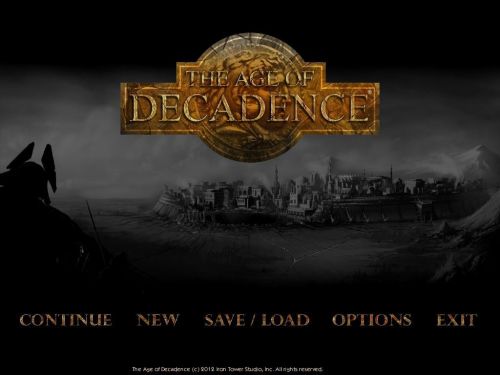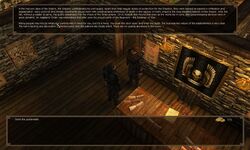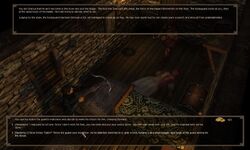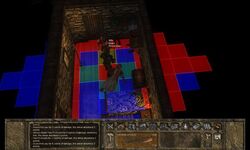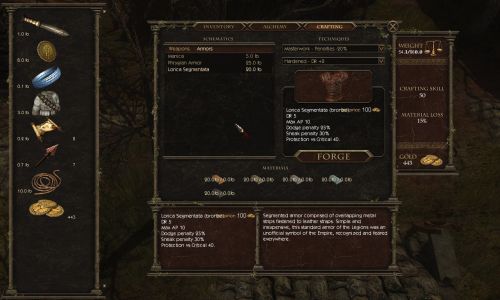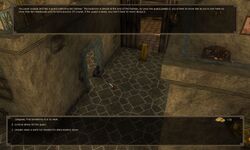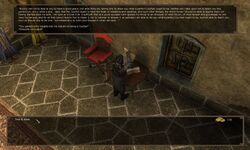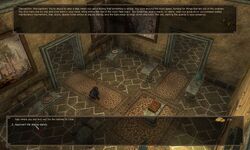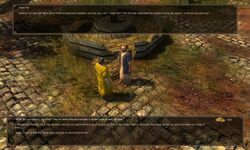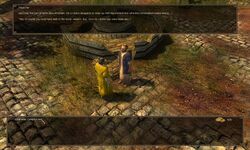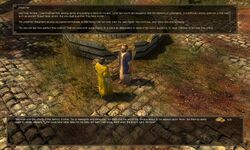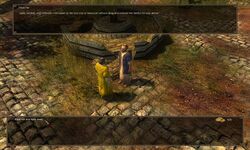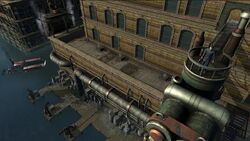The Age of Decadence Demo Preview
The Age of Decadence Demo Preview
Preview - posted by VentilatorOfDoom on Sun 12 February 2012, 11:44:36
Tags: Iron Tower Studio; The Age of DecadenceIn one way or another we got our hands on the Age of Decadence demo beta and decided to pen a preview. This article, too, will be added to the new and improved content system as soon as it is up.
... and here it is. Here's a slice:
Read on about how it delivers.
... and here it is. Here's a slice:
Those of you familiar with Vince D. Weller’s (a.k.a. Vault Dweller) take on how an RPG should be like, probably have certain expectations when it comes to how The Age of Decadence ticks. Let me immediately put it this way: judging by the demo it looks like the game does indeed deliver on the promises. The demo was hooking enough for me to play it several times in a row, trying out different backgrounds and fiddling around with an array of different combat builds, having fun. Bodes well, does it?
Read on about how it delivers.
The Age of Decadence - Demo Preview Impressions
Every once in a while we at the Codex fancy ourselves with some indie game or another. A new upstart and so far unknown indie crew, going by the name of Iron Tower Studio , granted us access to the demo of their post-apocalyptic cRPG „The Age of Decadence“. The demo is currently in serious beta-testing and due to release within an… appropriate time-frame. In the meantime the Iron Tower guys asked us to have a look at their feeble efforts, perhaps even asking them a few questions about the game afterwards, like „Uh, why does it suck?“
Those of you familiar with Vince D. Weller’s (a.k.a. Vault Dweller) take on how an RPG should be like, probably have certain expectations when it comes to how The Age of Decadence ticks. Let me immediately put it this way: judging by the demo it looks like the game does indeed deliver on the promises. The demo was hooking enough for me to play it several times in a row, trying out different backgrounds and fiddling around with an array of different combat builds, having fun. Bodes well, does it?
Now, on to the specifics:

To be honest, all those options, face, beard and so on, don’t seem to do much, it all looks rather same-ish.
But they have facial Sith-tattoos which make up for it.
The character creation, a familiar sight for those of you who tried themselves mastering the combat demo, lets you pick one of the eight backgrounds, spend a couple of stat- and skillpoints and tweak your appearance to your liking. Some of you, who got introduced to the cRPG genre only recently, might be a bit intimidated by all the numbers and stuff. Don’t be afraid, as a rule of thumb, the bigger the number, the better. For example, if you want to be good at sneaking, make the sneak-number go bigger by putting points into it. If you want to be good at dodging blows, put points into Dodge. If you want to cause massive mayhem with every very strike of your dagger, put your points into Critical Strike. You want to have the edge by crafting epic weapons and armors? There’s a whole crafting skill exactly for that. It’s that easy!
The demo takes place in Teron, a settlement under control of House Daratan, one of the major factions in the game. Things are happening in Teron and you’re right in the middle of it. Where exactly depends largely on your background. For example, a merchant arrived in Teron, someone who pissed off the merchant’s guild (The Commercium) earlier. He’s going to die, that’s for sure, but your role in the event isn’t set in stone. Perhaps you’re a member of the Commercium recruiting the assassin’s guild to get rid of him, perhaps you’re the assassin tasked with his removal. You can also be a thief, robbing him on behalf of the thieves guild, or a mercenary working as his bodyguard. It all depends on the trade you’ve picked on character creation. That’s how the demo works out, you’re experiencing the events in Teron from different angles, solving quests in different manners. You can most likely play the game ten times and still discover that things work out differently. Replayablity is indeed a feature.
Well, starting up the game for the first time I decided to roll up an assassin opting tokill shit keep the peace.
The reward for my first peace-keeping mission: skillpoints, loot and an assassin-colleague teaching me in alchemy. Sadly, alchemy isn’t implemented yet so for the time being this poison-knowledge isn’t of much use. Crafting on the other hand is implemented and it’s rather useful. Just with a humble skill level of 50 you’re already capable to craft some pretty good equipment which is far better than the stuff you could loot or buy.
I’ll give you a quick rundown on crafting. For starters, you’ll have to find someone, say, a smith, who’s willing to sell you schematics. Then you’ll need a decent crafting skill to apply useful techniques like „Hardened“ which increases the damage reduction of armor or „Masterwork“ which adds to the damage output of weapons. Lastly, you’ll need the materials, leather, wood or different metals in sufficient amount and voila! You can forge an item. It’s possible to buy materials but it’s much cheaper to decompose weapons or armors you’ve looted.
From all the screenshots in this article you’ll probably figure that the game has its fair share of text. The writing is rather good, at least as far as I – as a non-native speaker – can judge. Ol‘ Vault Dweller sure has a knack for writing, that much we’ve learned from all his reviews already. If your main acquaintance with Indie cRPGs are Spiderweb games and the like, you’ll probably be pleasantly surprised with the quality of the graphics and the music as well. However, let me shed some light on the truly strong points of the game.
Role-playing, also known as the ability to play a game according to the skills and features of your character, being able to solve quests and objectives in ways appropriate for your choice of stats and skills, is one of those strong points. Of course combat, being the backbone of your traditional RPG, is always an option but you can generally solve quests with your character’s skills as well. Take my playthrough with a Thief as an example: putting my points into traditional rogue stuff like Sneaking, Stealing, Lockpicking plus adding a bit Lore, Crafting, Disguise (in other games known as Bluff) and Persuasion, I’ve been able to come through the whole demo without any combat. OK, almost without any combat, towards the end I had to kill a single dude but I had some of my thieves-guild bros with me at that time and they did all the work. Of course, I dialogue-killed a few dudes by picking the [Critical Strike] dialogue option which pops up every once in while.
Every time you’re not opting for the combat approach to a quest the game takes you into text-adventure mode and lets you solve the quest with different skill- and stat-checks. Better hope you’re able to meet those checks or else you'll probably end up walking towards the light. In my playthrough as a merchant I was really big on social skills and came through the demo without raising a dagger even once. I could pull a lot of stunts purely with social skills, tricking people, double-crossing, fucking them and coming out on top in the end. One cool incident happened when I convinced a zealot who was preaching to the masses that I’m the Chosen One.
So, in conclusion, as a general rule quests are designed in a manner which allows for different solutions depending on your characters skills. Another strong point of the game is the turn-based combat. For me it was the highlight of the demo, the part that was the most fun. Sure, it’s cool to pull all kinds of tricks as a merchant or a thief, you save your skill points and when you encounter a skill check you can’t meet and the game throws you into – for your character – unwinnable combat , you reload, increase the skill in question and on it goes. In the end you give yourself a pat on the back for the clever application of your dialogue skills.
But you know what’s even cooler: killing them all. Contrary to how most cRPGs work, taking the combat route in The Age Of Decadence is likely the hard path. Succeeding in skill checks is easy, but killing all those fuckers, that’s where the real challenge awaits. And the game isn’t shy about it, odds are, your very first combat encounter will already tell you that combat in AoD means serious business. To get a character who’s truly capably to win every combat encounter in AoD you’ll probably need to dedicate yourself to combat skills entirely and even then maintain a narrow focus, not spreading your skill points too thin. Of course that means, having sub-par social skills, you'll likely be unable to solve quests in non-violent ways to begin with, with perhaps the exception of an Intimidate check every now and then, because your bodycount number factors into Intimidate checks. That’s right, NPCs in The Age Of Decadence know when you kill people frequently and they’re behavior might change accordingly.
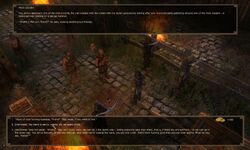

Actually, I wanted to name this mercenary character “Mercykiller”
but AoD is too oldschool for names with more than 10 chars.
Did you see how this guy totally avoided eye-contact? Because he shat his pants, that’s why!
Again, I can only repeat: In my opinion the combat is the highlight of the game and the most fun part. Perhaps it has something to do with the steep difficulty, but when you finally manage to eradicate the Raider’s camp or the Aurelian outpost it feels like a genuine achievement. Try the combat demo to get a feel for how AoD’s turn-based combat is like. Let me show off a few more screenshots of my combat achievements:
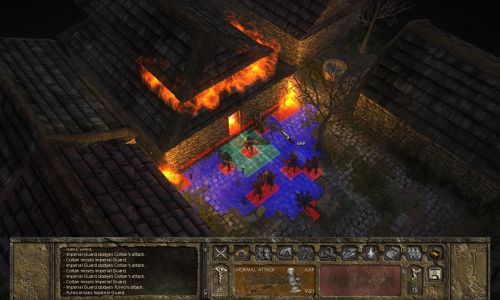
The "Boatmen of Styx" (the assassin's guild) eradicating the "Imperial Guards". Those fuckers sure deserved it.
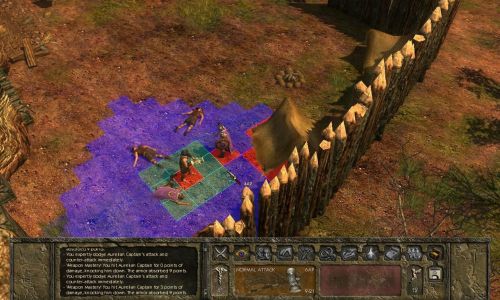
Bashing everyone flat at the Aurelian outpost using a big hammer.
Why a big hammer? See, people can't hurt you if they're already dead.
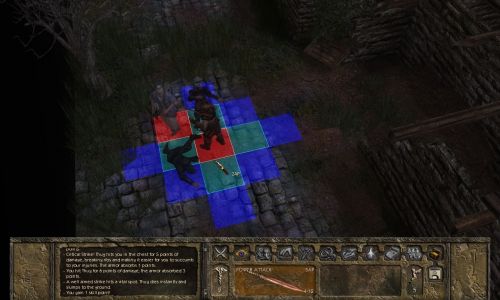
In a display of mind-boggling perseverance I reloaded and rolled up new characters for, like, 2 hours until I could kill the assassin (who killed the merchant) and the two thugs attacking Verdanis during the mercenary-vignette in one fell swoop. Of course, you can also pussy out if that's your thing.
All this sounds mighty positive, right? Well, it is. The Age of Decadence carries serious potential for awesomeness as far as I’m concerned, perhaps it’ll even be the best RPG since The Witcher 2.
Now on to the things that weren’t so good. In its current state the game is still plagued by a lot of bugs. Mostly scripting related bugs I presume, quest bugs, when you’re trying to do something in a sequence the scripter hasn’t foreseen and get stuck as a result, things like that. The game crashes every now and then, but not very often, for instance, if I played the game for, say, 8 hours it would crash twice or so. So, if you’re used to Bethesda games you can probably live with that, right?
Apart from that, the interface still requires a decent bit of polishing to be up to par, and the worst offender – the camera – will probably make you long for NWN2’s camera. Well, the good news is that the game is in beta-testing (and not released yet) exactly for the purpose of ironing out the bugs and polishing stuff up. So I sincerely hope neither of you will even encounter all these nuisances as soon as the full demo is released.
Lastly, after every major location you’ll get Fallout-style ending slides for that location, here’s a sample for the demo location “Teron”:
All in all, to be totally honest, I expected less from the game. I thought it would suck more, you know. Instead it has addictive turn-based combat, which will hopefully get even awesomer once alchemy is implemented, and provides an interesting storyline, warring factions, mutually exclusive content and quests which can be solved in a variety of ways. It’s almost like Vault Dweller was telling the truth all the time! But I cannot reasonably expect you to just take my word for it, right? Luckily, Elwro was kind enough to pen down his own impressions of the demo.
Elwro does some serious AoDing
Teron is a crumbling town, officially ran by Antidas of House Daratan, a noble whose rise to glory had been prophecised long ago, but who has been having much difficulty trying to fulfill the prophecy. Recent reports suggest an expedition of a rival House has been doing some secret work in a mine nearby, engaging the services of a famous loremaster. A contingent of the Imperial Guard is stationed in the town; the Empire lies in ruin, but in the new reality the Guard is still a formidable force hungry for new spheres of influence. The Commercium, a merchant-and-spy guild, like to keep everyone in check with the vast riches at its disposal. The Boatmen of Styx, professional assassins, will not simply take any contract, but will see to it that it provides them some gain in the long run – perhaps more influence in the town? All these forces (and I didn't mention some of them) have their own agendas, their own methods and means, and all of them have some serious plotting going on. You enter the picture either as an outsider or as someone with a background tied to a particular faction: e.g. a merchant or a knight in the service of House Daratan (“bodyguard with class” would be a better description). The choice of your background determines both the vignette (the prologue, giving you your faction's take on the town's situation, the motive for your actions and the opportunity for first choices), some of the quests you will receive during your stay in Teron, and the way the game presents the ending to you as the outcome of your actions from the perspective of your faction.
I will leave the discussion of other backgrounds to the other commenters; being somewhat pressed for time, I decided to play two contrasting builds: a dialogue-oriented merchant and combat-oriented knight (or, for a better word, 'praetor'), although in the latter case I couldn't bring myself to not investing a few points in persuasion. First, about the merchant. Already in the process of character creation I noticed the verbosity of the skill system, investing many points in Persuasion, Etiquette (but not Streetwise), Disguise and Lore. After the vignette, in which I made a choice to interfere in the conflict between two loremasters, a choice which would bite me in the end, it turned out that to get to the noble Antidas I would have to investigate the rival House's expedition to the nearby mine. And, which seems to be a rule in this game, there were many ways to do this. I will spoil just this little bit so that you can get a glimpse of what the game offers. So, what I eventually did was: disguise myself as a loremaster (proper clothing needed), bluff my way in (Disguise), investigate the equipment inside and set it to overheat while pretending that everything was OK (Lore), go out and shout for all the other people to go inside (Persuasion), so that they end up killed in the blast. No survivors, no witnesses, no problem for House Daratan. All this was achieved purely through various dialogue screens with lots of skill- and stat-checks. (Just to compare: how did I deal with the mine as a praetor in the service of Antidas? Well, I had people raid it and kill all the intruders, which allowed me to explore the ancient equipment at my leisure.)
In fact, I finished the whole playthrough as a merchant without a single fight. The game felt almost like a choose-your-own-adventure with a great number of various choices, lots of stat-checks, and plenty of content available for specific characters only. I loved every minute of it. As I said, much action is conducted via dialogue screens. And you cannot save during the dialogue. This is a wise choice because it prevents you from almost automatically reloading after a failed stat-check. That check might have happened after a long sequence of dialogue screens, perhaps also filled with stat-checks, which you'd have to repeat. The game's big advantage, which had to be difficult to achieve, is that you really prefer not to reload your game after something goes wrong (excluding being killed in combat, of course). At least in my case, I wanted to stick with the consequences the game provided for me – they were fair and reasonable. And hey, some of my other characters would succeed in that particular task, right? This brings me to the main point: replayability. Judging from the demo, Age of Decadence will be immensely replayable. And at three levels, at that: after finishing the demo as a merchant I immediately wanted to play the game as a member of a different faction, to get a different take on the situation, but also to play as a merchant with a different skill and stat distribution, to check out options unavailable for my original build; but also, which in other games would be ridiculous, to play exactly the same build and simply make different choices! My merchant ended up being a sort of a power behind the throne, facilitating a shift in the power distribution in the region, purely by use of persuasion, disguise, and, of course, money, insulting more than one person on his way but gaining powerful friends, too. But there were both diplomatic and combat-oriented options I steered clear of, leaving them for future playthroughs.
After the brutal-yet-combat-free choose-your-own-adventure experience of playing as a Commercium agent, I expected my knight playthrough to give me something completely different. I was wrong: while the events which unfolded were very much different, I still spent most of the time in the dialogue mode. Yes, I could have used the great turn-based combat mode often, but since I decided a 'knight' should have some points in both persuasion and etiquette, I had lots of interesting dialogue options, which I of course preferred. And again combat turned out to be optional. The game really has an immense number of dialogue lines which reflect your character's stat and skill level.
By playing characters of different backgrounds you get a different perspective on the main events which will play out in one way or another. For example, as a merchant I was instrumental in arranging an assassination but had no idea how it actually happened; as a knight I was told the assassination had already been arranged, but had to make sure a certain person was in a certain place at a certain time. Somehow I'm sure playing a character from a different faction would fill in still more details. Replayability – that's the key here.
In sum: even though there are quite a few bugs left, Age of Decadence is shaping up to be a truly great title for those who want their character's stats and their choices as players to have a visible impact on the game's world. All this in a low-magic setting, delivered with sumptuous writing, revolving around characters whose motivation you will find natural and down-to-earth. There will be no crying over lost wings here; no space hamsters of doom to brighten the day. There will be intrigue, treachery, and fight to the death under the desert sun. Looking forward!

What does a man need to do, to be able to run around naked in AoD without getting pestered by the guards?
So much for Elwro's impressions. Is that still not enough? Fine, Monolith decided to share his own impressions as well:
Monolith does some serious AoDing as well
Iron Tower Studio have done it. The game has yet to be released and my GF already hates it. Not a reason to worry, though, she's not exactly in the target group. But since I am that should tell you something good about Age of Decadence. When asking us to have a look at the demo Vince pressed us to give it at least two play-throughs because replayability is a feature. So I looked at my time schedule, took into account that I have been waiting for that game for quite a while now and decided that yes, I should be able to squeeze them in somehow. Three full and a plethora of partial play-throughs later (unlike Elwro I couldn't resist reloading – just to see the different outcomes) I agree with Vince – it is a feature. And I share the same impression that VentilatorOfDoom and Elwro presented earlier. You have to replay Age of Decadence if you want to get the whole picture and enjoy the different facets of the game.
2++ play-throughs
During my first play-through as a grifter – a con man, persuasive and a man of many faces – I sided with the Commercium (as said before, the Merchant guild). The lucky guy I am I invested in the right skills and made it to the end, dying only twice and making the best out of every situation – best for me that is. It was fun and satisfying, the possibilities were logical and the outcomes made sense. But I thought to myself that it seemed a little bit straightforward. That was it? Plus I didn't uncover one big secret because my lore skill wasn't high enough. So I replayed it right away. Having distributed my skillpoints more evenly, succeeding now wasn't as easy as before. And suddenly, when failing some persuasion checks, I had the option to ask another faction for help which opened up some backstabbing options later on. Using that build I finished the game thrice with three different major outcomes. And I didn't even touch another background. Plus, going through the impressions others had while playing the Commercium quest-line, I realized I missed out on roughly another fourth.
AoD pierced your armor and struck at your ego
At that point I had enough of backstabbing politicians and pretty words. My approach was similar to Elwro's as I reckoned it was time to add some notches to my axe hilt. Lucky me I chose the proper background. The mercenary doesn't care about fancy words or positive first impressions. He favors lasting impressions like a sword between the ribs. An hour later I was still trying to figure out what I'd been doing wrong. Combat in AoD is tough. Fortunately the game gives you a lot of options and different stats to play around with. And unlike in a lot of other RPGs here you should actually use them. Still, right at the beginning the options are limited (I have the starting equipment and can't visit a shop until the starting sequence is finished) and the option I used the most was “Start a new game/Load”. After about 5 restarts I finally made it. While my biggest enemy might have been the random number generator, I'm sure changing tactics and stats also made a huge difference. I specialized in a single weapon for the time being and learned the importance of blocking (the hard way), as well as proper positioning and isolating enemies. And to be fair, the game gave me the option not to fight – twice. So instead of the random number generator the culprit might have been my ego. Either way, the point got across. Prepare and fight at your own discretion. While luck makes a difference, so does your strategy, your skills and your equipment. But also: combat is not always the best option. In AoD you fight for your life – but so does your enemy. While in the usual RPG fighting over nothing is quite common, here you and your enemy both have adequate motivations. And survival is perhaps the most important one. Thus combat encounters are meaningful. Forget about filler combat – I didn't see the body count rise into the three digits (might mean I suck at this game, though).
I'm seriously lacking filler content...
That's something I want to expand further. In general filler content is hard to find in AoD. Throughout the game you fast-forward to the interesting bits – to places of action and dialogues. Often dialogue provides insta-teleportation-abilities, but other than that you can always use fast travel by choosing a marked location on the map screen. When going through a dialogue sequence that e.g. involves talking a guard into letting you speak with a noble, if you succeed, you won't be able to enjoy a 5 minute cinematic walk of your PC through corridors while being accompanied by the guard – no, the game assumes you've got the imagination and know what is happening and voila, you talk to the noble right away. Iron Tower Studio should get a medal for ditching the filler content because 1) the player doesn't have to bear it – the game respects the time I invest into it – and 2) I'm sure it was hell of a lot of work to include only content that is 100% interesting while leaving out all the time-wasting crap a lot of RPGs not only offer, but sometimes are based on in their entirety. They didn't take the easy way out unlike fully staffed developing houses with million dollar backings. And in the RPG developing business that means quite a lot.
The funny side of failure
When playing Arcanum there was one moment in particular that stood out for me, where I was taken aback because I didn't expect what happened. I killed G. Bates, a plot relevant and central NPC – the main quest giver at that point. I did it as usual out of curiosity, thought I messed up and as usual I expected to reload. But the game played on, recognized what I did and gave me options. I liked that and I have been looking for that moment in games since then. AoD offers a lot of similar moments. You get many chances to mess up. And while it indeed leads to certain death in a lot of cases, more often than not I got the chance to keep on playing and the game throws suitable options at me. Unfortunately there is also a bad side to it: If you are lucky or chose your skills very carefully you won't mess up and eventually won't even know there's even more to the game. I'm not sure how much that counts as valid criticism, though, because it's based on the conviction that what works is optimal. And that's something we learned from games that didn't go as far as AoD. So in order to appreciate it fully we have to change our approach from: “What is the best build?” to “What other build could I throw at that situation?”. In the end we're left with more fun so I opt for the latter.
Summing up the bad...
I wrote about what is good, so it's time to sum up what is bad. A whole article dedicated to the good , one paragraph dealing with the bad – that's sort of how I rate the demo of Age of Decadence. I'll start with the interface. There's still a lot of work that has to go into that. Some things are unintuitive, not as responsive as they should be, too slow – in the end I played the beta of the demo, so I could put that in parentheses as this are laughable complaints considering what has been achieved in regard of UI and playability. Having experienced how the team around Vince works I have no doubt this will be improved. Another weak spot is chance in combat. The random number generator can make a huge difference. I went through the same combat encounter a couple of times without adjusting my strategy and I would get destroyed 3 times out of 4, while absolutely destroying my enemies on the fourth try. It can be source of a lot of frustration but when it works out, oh, it can be sweet. Taking into account that this to some extent is a problem of TB combat in general and that the game gives a plethora of alternative options (if you have to proper character build), the complaint loses significance. Nevertheless, it's something that can be worked on, although that's just an impression and I don't know if there is still scope for improvement in regards of technical limitations. The last complaint is actually more apprehension and concerns the reliance of the game on skillchecks to such an extent. I understand that punishing obviously bad builds should take place and has to take place. But with the number of possibilities it seems very hard to foresee all combinations and all player motivations. I want to make clear that I don't complain about that being badly implemented in the demo – quite the contrary is the case. But a game with such a scope, it's not hard to imagine how easy it would be to miss implementing options for choices that might seem logical to some players but didn't occur to the developers or the testers. Again, having experienced how the team goes about improving the game and how intensively it's tested, it might be an irrational fear. I for one am looking forward to the full game and I'm getting right back to playing the demo – I'm sure I haven't even seen half of it.
So far, so good. I’m ending this article with a couple of questions we’ve asked Vault Dweller after having played the demo.
In the demo, depending on your background, you're experiencing the same events from different angles. You could, for instance, be the assassin sent to kill the unwelcome merchant or you can be his bodyguard. Is this approach representative of the whole game or is it just a demo thing.
To some degree. In Teron, for example, the events revolve around the Imperial Guards planning to take over. Different guilds will have different perspective and involvement in these events. For example, while the assassins guild simply gets the contract, if you play as a merchant you'll see that getting that contract wasn't that simple.
In your usual RPG if you would sneak you'd sneak, steal you'd steal and so on. In AoD everything but combat is done in text adventure mode. Why this design decision?
Because you don't really sneak or steal. You hit the sneak button and walk or crawl towards your goal in broad daylight, pretending to be invisible. Thief, of course, did it right, but it's the main aspect of the game.
We wanted to do turn-based sneaking and even put together a rough system, but never had the time to implement it properly. Maybe next time, if the game sells a few copies. The way I see it, text-based sneaking or stealing is more interesting then the standard setup, but it's a matter of opinion, obviously. At very least, it has more flavor.
In other words, we used the text-based approach because I think that:
Fully implemented system > text based approach > "traditional" approach.
What are the current release plans for the demo?
The content is done (by that I mean not the original content, but the extra quests and dialogues added as a result of the testers' feedback).
At the moment Oscar and I are going over the balance (combat, skill checks - for example, the thieves guild's questline's checks are too low, so you can go through the quests without failing and having to seek/try alternative ways; skill point rewards - looks like we were a bit too generous there), while Nick is busy fixing bugs.
The balance shouldn't take more than a week. The bugs will require more time. We'd like to release the demo in February, but if it's not ready, it's not ready. We're definitely close though.
If you had to estimate, content-wise, how big is Teron in comparison to the main game?
Roughly 25%, but it depends on what you're looking at. There are 20 locations in the game. The demo contains 3 locations:
Teron - a small crumbling town, a raiders camp, and a haunted mine.
So, if you're looking to explore, you have 17 more places to visit.
There are 3 towns in the game - the hubs of activity, factions, and quests. Some of the remaining 15 locations (20 overall minus 3 in the demo minus the other two towns) are similar to the mine and the camp (in a sense that they have people you can interact with), some are multi-level ruins like the tower of Zamedi - where the focus isn't on dealing with people but on exploring.
Having showed the demo to some people - how do you feel about the reception? Is it what you and the team expected?
To be honest, I didn't expect such a positive reaction. Sure, we all hoped that people will like the game, but at the same time I was aware that we took too many liberties with the design and I just wasn't sure how people would react.
The demo and thus a substantial part of the game is close to being finished. I think we can say it represents the finished product as a whole. Taking a look at it now and comparing it with what you had in mind when starting work on AoD - what worked out, what is different and what had to be ditched? Are you satisfied?
Considering that we had no experience when we started, we had to learn pretty much everything (usually, the trial-n-error style), so we were learning game development, while trying to make a game. Many ideas we had worked only on paper or worked well but clashed with other design elements and had to be ditched, like transferable action points, for example.
The game really evolved, and I’d say, matured over the years, so it’s very different than what I’ve originally had in mind. Satisfied? To some degree. After playing the game, you know as well as I do, that no feature in the game can be described as perfect (far from it, in fact), but the game “works” as a whole and we did deliver on what we promised. I'm definitely happy about it.
Do you regret adding a feature or not ditching an element of the game considering the time you had to invest into it? If yes, what feature was it and which part of the game should have gotten more attention?
I regret not being able to include a turn-based stealth system. I think it would have been really cool, but we don’t have time to do it right. Everything else we wanted is in.
Are you in contact with any big gaming sites regarding previews of the demo? What are your expectations concerning coverage? Any positive/negative surprises?
Not in contact with any big sites at the moment (not that I expect it to change as our game is a mix of two dead genres – text adventures and turn-based RPG). I’m sure that sites that have shown some interest in the past will cover the demo (we did get some preview requests) and reach people who might like the game.
Every once in a while we at the Codex fancy ourselves with some indie game or another. A new upstart and so far unknown indie crew, going by the name of Iron Tower Studio , granted us access to the demo of their post-apocalyptic cRPG „The Age of Decadence“. The demo is currently in serious beta-testing and due to release within an… appropriate time-frame. In the meantime the Iron Tower guys asked us to have a look at their feeble efforts, perhaps even asking them a few questions about the game afterwards, like „Uh, why does it suck?“
Those of you familiar with Vince D. Weller’s (a.k.a. Vault Dweller) take on how an RPG should be like, probably have certain expectations when it comes to how The Age of Decadence ticks. Let me immediately put it this way: judging by the demo it looks like the game does indeed deliver on the promises. The demo was hooking enough for me to play it several times in a row, trying out different backgrounds and fiddling around with an array of different combat builds, having fun. Bodes well, does it?
Now, on to the specifics:

To be honest, all those options, face, beard and so on, don’t seem to do much, it all looks rather same-ish.
But they have facial Sith-tattoos which make up for it.
The demo takes place in Teron, a settlement under control of House Daratan, one of the major factions in the game. Things are happening in Teron and you’re right in the middle of it. Where exactly depends largely on your background. For example, a merchant arrived in Teron, someone who pissed off the merchant’s guild (The Commercium) earlier. He’s going to die, that’s for sure, but your role in the event isn’t set in stone. Perhaps you’re a member of the Commercium recruiting the assassin’s guild to get rid of him, perhaps you’re the assassin tasked with his removal. You can also be a thief, robbing him on behalf of the thieves guild, or a mercenary working as his bodyguard. It all depends on the trade you’ve picked on character creation. That’s how the demo works out, you’re experiencing the events in Teron from different angles, solving quests in different manners. You can most likely play the game ten times and still discover that things work out differently. Replayablity is indeed a feature.
Well, starting up the game for the first time I decided to roll up an assassin opting to
The reward for my first peace-keeping mission: skillpoints, loot and an assassin-colleague teaching me in alchemy. Sadly, alchemy isn’t implemented yet so for the time being this poison-knowledge isn’t of much use. Crafting on the other hand is implemented and it’s rather useful. Just with a humble skill level of 50 you’re already capable to craft some pretty good equipment which is far better than the stuff you could loot or buy.
I’ll give you a quick rundown on crafting. For starters, you’ll have to find someone, say, a smith, who’s willing to sell you schematics. Then you’ll need a decent crafting skill to apply useful techniques like „Hardened“ which increases the damage reduction of armor or „Masterwork“ which adds to the damage output of weapons. Lastly, you’ll need the materials, leather, wood or different metals in sufficient amount and voila! You can forge an item. It’s possible to buy materials but it’s much cheaper to decompose weapons or armors you’ve looted.
From all the screenshots in this article you’ll probably figure that the game has its fair share of text. The writing is rather good, at least as far as I – as a non-native speaker – can judge. Ol‘ Vault Dweller sure has a knack for writing, that much we’ve learned from all his reviews already. If your main acquaintance with Indie cRPGs are Spiderweb games and the like, you’ll probably be pleasantly surprised with the quality of the graphics and the music as well. However, let me shed some light on the truly strong points of the game.
Role-playing, also known as the ability to play a game according to the skills and features of your character, being able to solve quests and objectives in ways appropriate for your choice of stats and skills, is one of those strong points. Of course combat, being the backbone of your traditional RPG, is always an option but you can generally solve quests with your character’s skills as well. Take my playthrough with a Thief as an example: putting my points into traditional rogue stuff like Sneaking, Stealing, Lockpicking plus adding a bit Lore, Crafting, Disguise (in other games known as Bluff) and Persuasion, I’ve been able to come through the whole demo without any combat. OK, almost without any combat, towards the end I had to kill a single dude but I had some of my thieves-guild bros with me at that time and they did all the work. Of course, I dialogue-killed a few dudes by picking the [Critical Strike] dialogue option which pops up every once in while.
Every time you’re not opting for the combat approach to a quest the game takes you into text-adventure mode and lets you solve the quest with different skill- and stat-checks. Better hope you’re able to meet those checks or else you'll probably end up walking towards the light. In my playthrough as a merchant I was really big on social skills and came through the demo without raising a dagger even once. I could pull a lot of stunts purely with social skills, tricking people, double-crossing, fucking them and coming out on top in the end. One cool incident happened when I convinced a zealot who was preaching to the masses that I’m the Chosen One.
So, in conclusion, as a general rule quests are designed in a manner which allows for different solutions depending on your characters skills. Another strong point of the game is the turn-based combat. For me it was the highlight of the demo, the part that was the most fun. Sure, it’s cool to pull all kinds of tricks as a merchant or a thief, you save your skill points and when you encounter a skill check you can’t meet and the game throws you into – for your character – unwinnable combat , you reload, increase the skill in question and on it goes. In the end you give yourself a pat on the back for the clever application of your dialogue skills.
But you know what’s even cooler: killing them all. Contrary to how most cRPGs work, taking the combat route in The Age Of Decadence is likely the hard path. Succeeding in skill checks is easy, but killing all those fuckers, that’s where the real challenge awaits. And the game isn’t shy about it, odds are, your very first combat encounter will already tell you that combat in AoD means serious business. To get a character who’s truly capably to win every combat encounter in AoD you’ll probably need to dedicate yourself to combat skills entirely and even then maintain a narrow focus, not spreading your skill points too thin. Of course that means, having sub-par social skills, you'll likely be unable to solve quests in non-violent ways to begin with, with perhaps the exception of an Intimidate check every now and then, because your bodycount number factors into Intimidate checks. That’s right, NPCs in The Age Of Decadence know when you kill people frequently and they’re behavior might change accordingly.


Actually, I wanted to name this mercenary character “Mercykiller”
but AoD is too oldschool for names with more than 10 chars.
Did you see how this guy totally avoided eye-contact? Because he shat his pants, that’s why!
Again, I can only repeat: In my opinion the combat is the highlight of the game and the most fun part. Perhaps it has something to do with the steep difficulty, but when you finally manage to eradicate the Raider’s camp or the Aurelian outpost it feels like a genuine achievement. Try the combat demo to get a feel for how AoD’s turn-based combat is like. Let me show off a few more screenshots of my combat achievements:

The "Boatmen of Styx" (the assassin's guild) eradicating the "Imperial Guards". Those fuckers sure deserved it.

Bashing everyone flat at the Aurelian outpost using a big hammer.
Why a big hammer? See, people can't hurt you if they're already dead.

In a display of mind-boggling perseverance I reloaded and rolled up new characters for, like, 2 hours until I could kill the assassin (who killed the merchant) and the two thugs attacking Verdanis during the mercenary-vignette in one fell swoop. Of course, you can also pussy out if that's your thing.
All this sounds mighty positive, right? Well, it is. The Age of Decadence carries serious potential for awesomeness as far as I’m concerned, perhaps it’ll even be the best RPG since The Witcher 2.
Now on to the things that weren’t so good. In its current state the game is still plagued by a lot of bugs. Mostly scripting related bugs I presume, quest bugs, when you’re trying to do something in a sequence the scripter hasn’t foreseen and get stuck as a result, things like that. The game crashes every now and then, but not very often, for instance, if I played the game for, say, 8 hours it would crash twice or so. So, if you’re used to Bethesda games you can probably live with that, right?
Apart from that, the interface still requires a decent bit of polishing to be up to par, and the worst offender – the camera – will probably make you long for NWN2’s camera. Well, the good news is that the game is in beta-testing (and not released yet) exactly for the purpose of ironing out the bugs and polishing stuff up. So I sincerely hope neither of you will even encounter all these nuisances as soon as the full demo is released.
Lastly, after every major location you’ll get Fallout-style ending slides for that location, here’s a sample for the demo location “Teron”:
All in all, to be totally honest, I expected less from the game. I thought it would suck more, you know. Instead it has addictive turn-based combat, which will hopefully get even awesomer once alchemy is implemented, and provides an interesting storyline, warring factions, mutually exclusive content and quests which can be solved in a variety of ways. It’s almost like Vault Dweller was telling the truth all the time! But I cannot reasonably expect you to just take my word for it, right? Luckily, Elwro was kind enough to pen down his own impressions of the demo.
Elwro does some serious AoDing
Teron is a crumbling town, officially ran by Antidas of House Daratan, a noble whose rise to glory had been prophecised long ago, but who has been having much difficulty trying to fulfill the prophecy. Recent reports suggest an expedition of a rival House has been doing some secret work in a mine nearby, engaging the services of a famous loremaster. A contingent of the Imperial Guard is stationed in the town; the Empire lies in ruin, but in the new reality the Guard is still a formidable force hungry for new spheres of influence. The Commercium, a merchant-and-spy guild, like to keep everyone in check with the vast riches at its disposal. The Boatmen of Styx, professional assassins, will not simply take any contract, but will see to it that it provides them some gain in the long run – perhaps more influence in the town? All these forces (and I didn't mention some of them) have their own agendas, their own methods and means, and all of them have some serious plotting going on. You enter the picture either as an outsider or as someone with a background tied to a particular faction: e.g. a merchant or a knight in the service of House Daratan (“bodyguard with class” would be a better description). The choice of your background determines both the vignette (the prologue, giving you your faction's take on the town's situation, the motive for your actions and the opportunity for first choices), some of the quests you will receive during your stay in Teron, and the way the game presents the ending to you as the outcome of your actions from the perspective of your faction.
I will leave the discussion of other backgrounds to the other commenters; being somewhat pressed for time, I decided to play two contrasting builds: a dialogue-oriented merchant and combat-oriented knight (or, for a better word, 'praetor'), although in the latter case I couldn't bring myself to not investing a few points in persuasion. First, about the merchant. Already in the process of character creation I noticed the verbosity of the skill system, investing many points in Persuasion, Etiquette (but not Streetwise), Disguise and Lore. After the vignette, in which I made a choice to interfere in the conflict between two loremasters, a choice which would bite me in the end, it turned out that to get to the noble Antidas I would have to investigate the rival House's expedition to the nearby mine. And, which seems to be a rule in this game, there were many ways to do this. I will spoil just this little bit so that you can get a glimpse of what the game offers. So, what I eventually did was: disguise myself as a loremaster (proper clothing needed), bluff my way in (Disguise), investigate the equipment inside and set it to overheat while pretending that everything was OK (Lore), go out and shout for all the other people to go inside (Persuasion), so that they end up killed in the blast. No survivors, no witnesses, no problem for House Daratan. All this was achieved purely through various dialogue screens with lots of skill- and stat-checks. (Just to compare: how did I deal with the mine as a praetor in the service of Antidas? Well, I had people raid it and kill all the intruders, which allowed me to explore the ancient equipment at my leisure.)
In fact, I finished the whole playthrough as a merchant without a single fight. The game felt almost like a choose-your-own-adventure with a great number of various choices, lots of stat-checks, and plenty of content available for specific characters only. I loved every minute of it. As I said, much action is conducted via dialogue screens. And you cannot save during the dialogue. This is a wise choice because it prevents you from almost automatically reloading after a failed stat-check. That check might have happened after a long sequence of dialogue screens, perhaps also filled with stat-checks, which you'd have to repeat. The game's big advantage, which had to be difficult to achieve, is that you really prefer not to reload your game after something goes wrong (excluding being killed in combat, of course). At least in my case, I wanted to stick with the consequences the game provided for me – they were fair and reasonable. And hey, some of my other characters would succeed in that particular task, right? This brings me to the main point: replayability. Judging from the demo, Age of Decadence will be immensely replayable. And at three levels, at that: after finishing the demo as a merchant I immediately wanted to play the game as a member of a different faction, to get a different take on the situation, but also to play as a merchant with a different skill and stat distribution, to check out options unavailable for my original build; but also, which in other games would be ridiculous, to play exactly the same build and simply make different choices! My merchant ended up being a sort of a power behind the throne, facilitating a shift in the power distribution in the region, purely by use of persuasion, disguise, and, of course, money, insulting more than one person on his way but gaining powerful friends, too. But there were both diplomatic and combat-oriented options I steered clear of, leaving them for future playthroughs.
After the brutal-yet-combat-free choose-your-own-adventure experience of playing as a Commercium agent, I expected my knight playthrough to give me something completely different. I was wrong: while the events which unfolded were very much different, I still spent most of the time in the dialogue mode. Yes, I could have used the great turn-based combat mode often, but since I decided a 'knight' should have some points in both persuasion and etiquette, I had lots of interesting dialogue options, which I of course preferred. And again combat turned out to be optional. The game really has an immense number of dialogue lines which reflect your character's stat and skill level.
By playing characters of different backgrounds you get a different perspective on the main events which will play out in one way or another. For example, as a merchant I was instrumental in arranging an assassination but had no idea how it actually happened; as a knight I was told the assassination had already been arranged, but had to make sure a certain person was in a certain place at a certain time. Somehow I'm sure playing a character from a different faction would fill in still more details. Replayability – that's the key here.
In sum: even though there are quite a few bugs left, Age of Decadence is shaping up to be a truly great title for those who want their character's stats and their choices as players to have a visible impact on the game's world. All this in a low-magic setting, delivered with sumptuous writing, revolving around characters whose motivation you will find natural and down-to-earth. There will be no crying over lost wings here; no space hamsters of doom to brighten the day. There will be intrigue, treachery, and fight to the death under the desert sun. Looking forward!

What does a man need to do, to be able to run around naked in AoD without getting pestered by the guards?
So much for Elwro's impressions. Is that still not enough? Fine, Monolith decided to share his own impressions as well:
Monolith does some serious AoDing as well
Iron Tower Studio have done it. The game has yet to be released and my GF already hates it. Not a reason to worry, though, she's not exactly in the target group. But since I am that should tell you something good about Age of Decadence. When asking us to have a look at the demo Vince pressed us to give it at least two play-throughs because replayability is a feature. So I looked at my time schedule, took into account that I have been waiting for that game for quite a while now and decided that yes, I should be able to squeeze them in somehow. Three full and a plethora of partial play-throughs later (unlike Elwro I couldn't resist reloading – just to see the different outcomes) I agree with Vince – it is a feature. And I share the same impression that VentilatorOfDoom and Elwro presented earlier. You have to replay Age of Decadence if you want to get the whole picture and enjoy the different facets of the game.
2++ play-throughs
During my first play-through as a grifter – a con man, persuasive and a man of many faces – I sided with the Commercium (as said before, the Merchant guild). The lucky guy I am I invested in the right skills and made it to the end, dying only twice and making the best out of every situation – best for me that is. It was fun and satisfying, the possibilities were logical and the outcomes made sense. But I thought to myself that it seemed a little bit straightforward. That was it? Plus I didn't uncover one big secret because my lore skill wasn't high enough. So I replayed it right away. Having distributed my skillpoints more evenly, succeeding now wasn't as easy as before. And suddenly, when failing some persuasion checks, I had the option to ask another faction for help which opened up some backstabbing options later on. Using that build I finished the game thrice with three different major outcomes. And I didn't even touch another background. Plus, going through the impressions others had while playing the Commercium quest-line, I realized I missed out on roughly another fourth.
AoD pierced your armor and struck at your ego
At that point I had enough of backstabbing politicians and pretty words. My approach was similar to Elwro's as I reckoned it was time to add some notches to my axe hilt. Lucky me I chose the proper background. The mercenary doesn't care about fancy words or positive first impressions. He favors lasting impressions like a sword between the ribs. An hour later I was still trying to figure out what I'd been doing wrong. Combat in AoD is tough. Fortunately the game gives you a lot of options and different stats to play around with. And unlike in a lot of other RPGs here you should actually use them. Still, right at the beginning the options are limited (I have the starting equipment and can't visit a shop until the starting sequence is finished) and the option I used the most was “Start a new game/Load”. After about 5 restarts I finally made it. While my biggest enemy might have been the random number generator, I'm sure changing tactics and stats also made a huge difference. I specialized in a single weapon for the time being and learned the importance of blocking (the hard way), as well as proper positioning and isolating enemies. And to be fair, the game gave me the option not to fight – twice. So instead of the random number generator the culprit might have been my ego. Either way, the point got across. Prepare and fight at your own discretion. While luck makes a difference, so does your strategy, your skills and your equipment. But also: combat is not always the best option. In AoD you fight for your life – but so does your enemy. While in the usual RPG fighting over nothing is quite common, here you and your enemy both have adequate motivations. And survival is perhaps the most important one. Thus combat encounters are meaningful. Forget about filler combat – I didn't see the body count rise into the three digits (might mean I suck at this game, though).
I'm seriously lacking filler content...
That's something I want to expand further. In general filler content is hard to find in AoD. Throughout the game you fast-forward to the interesting bits – to places of action and dialogues. Often dialogue provides insta-teleportation-abilities, but other than that you can always use fast travel by choosing a marked location on the map screen. When going through a dialogue sequence that e.g. involves talking a guard into letting you speak with a noble, if you succeed, you won't be able to enjoy a 5 minute cinematic walk of your PC through corridors while being accompanied by the guard – no, the game assumes you've got the imagination and know what is happening and voila, you talk to the noble right away. Iron Tower Studio should get a medal for ditching the filler content because 1) the player doesn't have to bear it – the game respects the time I invest into it – and 2) I'm sure it was hell of a lot of work to include only content that is 100% interesting while leaving out all the time-wasting crap a lot of RPGs not only offer, but sometimes are based on in their entirety. They didn't take the easy way out unlike fully staffed developing houses with million dollar backings. And in the RPG developing business that means quite a lot.
The funny side of failure
When playing Arcanum there was one moment in particular that stood out for me, where I was taken aback because I didn't expect what happened. I killed G. Bates, a plot relevant and central NPC – the main quest giver at that point. I did it as usual out of curiosity, thought I messed up and as usual I expected to reload. But the game played on, recognized what I did and gave me options. I liked that and I have been looking for that moment in games since then. AoD offers a lot of similar moments. You get many chances to mess up. And while it indeed leads to certain death in a lot of cases, more often than not I got the chance to keep on playing and the game throws suitable options at me. Unfortunately there is also a bad side to it: If you are lucky or chose your skills very carefully you won't mess up and eventually won't even know there's even more to the game. I'm not sure how much that counts as valid criticism, though, because it's based on the conviction that what works is optimal. And that's something we learned from games that didn't go as far as AoD. So in order to appreciate it fully we have to change our approach from: “What is the best build?” to “What other build could I throw at that situation?”. In the end we're left with more fun so I opt for the latter.
Summing up the bad...
I wrote about what is good, so it's time to sum up what is bad. A whole article dedicated to the good , one paragraph dealing with the bad – that's sort of how I rate the demo of Age of Decadence. I'll start with the interface. There's still a lot of work that has to go into that. Some things are unintuitive, not as responsive as they should be, too slow – in the end I played the beta of the demo, so I could put that in parentheses as this are laughable complaints considering what has been achieved in regard of UI and playability. Having experienced how the team around Vince works I have no doubt this will be improved. Another weak spot is chance in combat. The random number generator can make a huge difference. I went through the same combat encounter a couple of times without adjusting my strategy and I would get destroyed 3 times out of 4, while absolutely destroying my enemies on the fourth try. It can be source of a lot of frustration but when it works out, oh, it can be sweet. Taking into account that this to some extent is a problem of TB combat in general and that the game gives a plethora of alternative options (if you have to proper character build), the complaint loses significance. Nevertheless, it's something that can be worked on, although that's just an impression and I don't know if there is still scope for improvement in regards of technical limitations. The last complaint is actually more apprehension and concerns the reliance of the game on skillchecks to such an extent. I understand that punishing obviously bad builds should take place and has to take place. But with the number of possibilities it seems very hard to foresee all combinations and all player motivations. I want to make clear that I don't complain about that being badly implemented in the demo – quite the contrary is the case. But a game with such a scope, it's not hard to imagine how easy it would be to miss implementing options for choices that might seem logical to some players but didn't occur to the developers or the testers. Again, having experienced how the team goes about improving the game and how intensively it's tested, it might be an irrational fear. I for one am looking forward to the full game and I'm getting right back to playing the demo – I'm sure I haven't even seen half of it.
So far, so good. I’m ending this article with a couple of questions we’ve asked Vault Dweller after having played the demo.
In the demo, depending on your background, you're experiencing the same events from different angles. You could, for instance, be the assassin sent to kill the unwelcome merchant or you can be his bodyguard. Is this approach representative of the whole game or is it just a demo thing.
To some degree. In Teron, for example, the events revolve around the Imperial Guards planning to take over. Different guilds will have different perspective and involvement in these events. For example, while the assassins guild simply gets the contract, if you play as a merchant you'll see that getting that contract wasn't that simple.
In your usual RPG if you would sneak you'd sneak, steal you'd steal and so on. In AoD everything but combat is done in text adventure mode. Why this design decision?
Because you don't really sneak or steal. You hit the sneak button and walk or crawl towards your goal in broad daylight, pretending to be invisible. Thief, of course, did it right, but it's the main aspect of the game.
We wanted to do turn-based sneaking and even put together a rough system, but never had the time to implement it properly. Maybe next time, if the game sells a few copies. The way I see it, text-based sneaking or stealing is more interesting then the standard setup, but it's a matter of opinion, obviously. At very least, it has more flavor.
In other words, we used the text-based approach because I think that:
Fully implemented system > text based approach > "traditional" approach.
What are the current release plans for the demo?
The content is done (by that I mean not the original content, but the extra quests and dialogues added as a result of the testers' feedback).
At the moment Oscar and I are going over the balance (combat, skill checks - for example, the thieves guild's questline's checks are too low, so you can go through the quests without failing and having to seek/try alternative ways; skill point rewards - looks like we were a bit too generous there), while Nick is busy fixing bugs.
The balance shouldn't take more than a week. The bugs will require more time. We'd like to release the demo in February, but if it's not ready, it's not ready. We're definitely close though.
If you had to estimate, content-wise, how big is Teron in comparison to the main game?
Roughly 25%, but it depends on what you're looking at. There are 20 locations in the game. The demo contains 3 locations:
Teron - a small crumbling town, a raiders camp, and a haunted mine.
So, if you're looking to explore, you have 17 more places to visit.
There are 3 towns in the game - the hubs of activity, factions, and quests. Some of the remaining 15 locations (20 overall minus 3 in the demo minus the other two towns) are similar to the mine and the camp (in a sense that they have people you can interact with), some are multi-level ruins like the tower of Zamedi - where the focus isn't on dealing with people but on exploring.
Having showed the demo to some people - how do you feel about the reception? Is it what you and the team expected?
To be honest, I didn't expect such a positive reaction. Sure, we all hoped that people will like the game, but at the same time I was aware that we took too many liberties with the design and I just wasn't sure how people would react.
The demo and thus a substantial part of the game is close to being finished. I think we can say it represents the finished product as a whole. Taking a look at it now and comparing it with what you had in mind when starting work on AoD - what worked out, what is different and what had to be ditched? Are you satisfied?
Considering that we had no experience when we started, we had to learn pretty much everything (usually, the trial-n-error style), so we were learning game development, while trying to make a game. Many ideas we had worked only on paper or worked well but clashed with other design elements and had to be ditched, like transferable action points, for example.
The game really evolved, and I’d say, matured over the years, so it’s very different than what I’ve originally had in mind. Satisfied? To some degree. After playing the game, you know as well as I do, that no feature in the game can be described as perfect (far from it, in fact), but the game “works” as a whole and we did deliver on what we promised. I'm definitely happy about it.
Do you regret adding a feature or not ditching an element of the game considering the time you had to invest into it? If yes, what feature was it and which part of the game should have gotten more attention?
I regret not being able to include a turn-based stealth system. I think it would have been really cool, but we don’t have time to do it right. Everything else we wanted is in.
Are you in contact with any big gaming sites regarding previews of the demo? What are your expectations concerning coverage? Any positive/negative surprises?
Not in contact with any big sites at the moment (not that I expect it to change as our game is a mix of two dead genres – text adventures and turn-based RPG). I’m sure that sites that have shown some interest in the past will cover the demo (we did get some preview requests) and reach people who might like the game.





